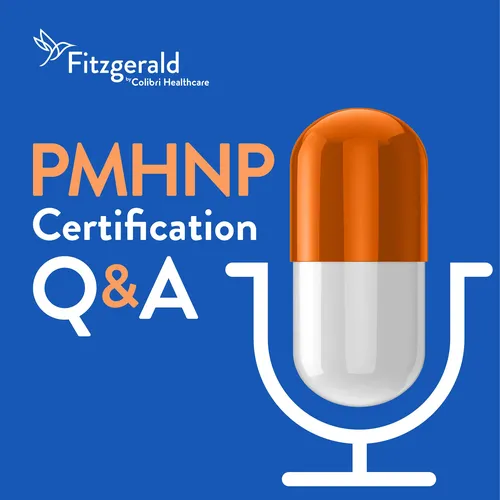
PMHNP Certification Q & A
This podcast is for NP students studying to pass their PMHNP certification exam. Expert Fitzgerald faculty clinicians share their knowledge and experience to help you dissect the anatomy of a test question so you can better understand how to arrive at the correct test answer.
- Update frequency
- every 7 days
- Average duration
- 6 minutes
- Episodes
- 85
- Years Active
- 2024 - 2025

Psychiatric Physical Assessment
A.G. is a 51-year-old female patient who is being managed for a variety of mental health conditions including bipolar disorder, opioid use disorder, generalized anxiety disorder, and adjustment disor…

Perinatal Cultural Care
A 31-year-old Middle Eastern female presents to establish care. She recently relocated to the United States with her husband and is struggling with living in an environment so different from that in …

Panic Attack Symptom Assessment
The PMHNP is conducting a new patient assessment with a patient who has self-referred for treatment of her panic attacks. The patient relates that she has had anxiety for years, and that she has epis…

Bipolar Treatment Plan Adjustment
A 22-year-old female patient is transferred to your care after another provider in the practice retired. She has been managed for bipolar I disorder for 3 years and has had some challenging extremes …

Pharmacotherapeutic Options for Bipolar Depression
A patient with a history of rapid-cycling bipolar disorder presents for evaluation of her current, profound depressive symptoms. The patient has been maintained for the last two years on valproic aci…

Depression Pre-Treatment Assessment
The PMHNP is seeing a patient who presents for complaint of depressive symptoms. The patient reports a history of anhedonia, hopelessness, worthlessness, sleep dysfunction, marked decrease in appetit…

Countertransference Awareness
The PMHNP has a new patient who reminds her of a former teacher who played an important role in her life and whom she regards as a mentor. The NP is concerned that she may express countertransference…

Psychiatric Refocusing Intervention
The PMHNP is conducting a follow-up appointment with a patient who is being treated for generalized anxiety disorder. The patient has a long-standing difficult relationship with her mother and today …

Pediatric Social Assessment
The mother of a 3-year-old female brings her daughter in for a psychiatric evaluation. The mother is concerned because she sometimes sees her daughter talking to an “imaginary friend” and Mom is worr…

Serotonergic Adverse Effects
The PMNP is evaluating a patient who is being treated for obsessive compulsive disorder with fluoxetine 60 mg daily. The patient has been on fluoxetine for months without any concerning adverse effec…

Acute Overdose Management
The PMHNP is on call at the residential treatment facility and is called to urgently see a patient being treated for methamphetamine use disorder. The patient was admitted earlier this day and being …

Autism Associated Findings
A 32-year-old female patient tells the PMHNP in the course of an office visit that her toddler’s pediatrician has suggested that the 3-year-old be referred for further assessment because his MCHAT-R …

Substance Use Screening
Which of the following is a true statement with respect to the CAGE-AID questionnaire?
A. It is a 5-item questionnaire used to screen for alcohol use disorder
B. A “yes” answer to 1 item is considere…

Metabolic Symptom Assessment
The PMHNP has ordered a comprehensive metabolic panel, CBC, TSH, and HgbA1c as part of a new patient screening panel to evaluate very generic complaints of fatigue, decreased motivation, and unplanne…

SSRI Clinical Outcomes
The PMHNP is seeing a patient who has been in Exposure-Response Therapy for obsessive-compulsive disorder for the last four months with suboptimal clinical improvement. After consulting with the ther…

Developmental Conflicts
Developmental theorists often assert that dysfunction of some sort during growth and development may result in psychopathological traits in adulthood.
According to Erikson’s Developmental Theory, whi…

Gender Dysphoria Diagnosis
A 15-year-old male patient reveals that he does not feel comfortable in his body.
When considering a diagnosis of gender dysphoria the PMHNP recognizes that which of the following must be present to …

Therapeutic Techniques
A 27-year-old female presents for therapy because she and her new husband are having difficulty adjusting to their new roles as spouses sharing a household who both work full time. There have been so…

Therapeutic Approach Recognition
The PMHNP is evaluating a patient in follow-up and despite appropriate pharmacotherapy and psychotherapy the patient has not achieved a successful remission. The patient states that his therapist is …

Identifying Passive Aggression
Patient in mental health care may be at increased risk for demonstrating unhealthy coping mechanisms or inappropriate responses to distress. When your patient is angry with you for not making a medic…